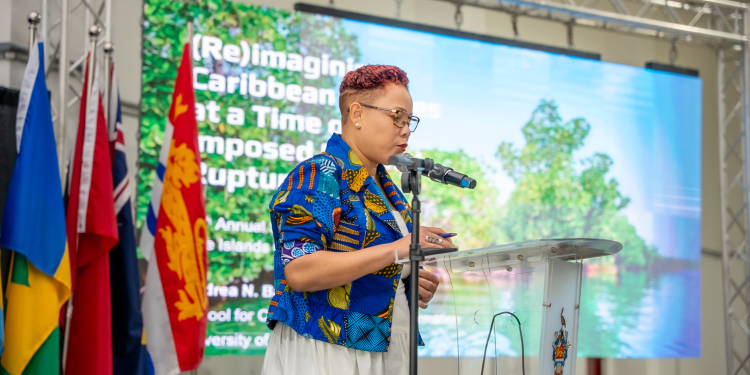Caribbean Scholar, Dr. Andrea Baldwin has proposed that the Caribbean must reimagine its response to the ruptures in today’s society in light of the new global trends.
Baldwin, Associate Professor of Gender and Ethnic Studies at the University of Utah, delivered the Sir Arthur Lewis Distinguished Lecture this month, marking a highlight of the 26th Annual Sir Arthur Lewis Institute of Social and Economic Studies (SALISES) Conference at The University of the West Indies (UWI) Five Islands Campus.
In her lecture entitled “(Re)Imagining Caribbean Futures at a time of Imposed Epochal Rapture,” Dr. Baldwin introduced the concept of “brackish economies,” building upon Sir Arthur Lewis’s dual sector model to propose a new economic framework for the Caribbean.
“The Caribbean is not bound by history. It is a guide, a conductor of new frequencies through rituals, rebellions, and rhythms. Caribbean people have long practiced futurity. We know how to cultivate possibility from contradiction,” Baldwin told the audience of academic leaders, government officials, and conference delegates.
Baldwin’s lecture examined three major “ruptures” in Caribbean history: colonialism, post-World War II global economic restructuring, and current climate collapse. She argued that Caribbean societies have consistently responded to these challenges with creativity and resilience.
“Each rupture is also a portal, a chance to build something new,” Baldwin said. “As Sir Arthur Lewis taught, people, not profits, drive transformation. Equity is as important as efficiency, and sustainable futures must center justice.”
Baldwin, a Barbadian scholar, developed the “brackish economies” model by drawing inspiration from the unique ecological systems of the Caribbean. The model envisions economies not based solely on traditional metrics like GDP, but centered on care, community, and environmental stewardship.
“What if instead of growth at all costs, we modeled our economies on the mangrove — flexible, rooted, cooperative?” Baldwin asked, challenging conventional economic thinking.
Professor Justin Robinson, Pro-Vice Chancellor and Principal of UWI Five Islands Campus, praised Baldwin’s lecture as “thought-provoking and insightful,” highlighting how it connected economic theory with Caribbean realities especially in this turbulent time with shifting geo-political boundaries and trends.
The lecture was attended by distinguished guests including Sir Rodney Williams, Governor General of Antigua and Barbuda and Lady Williams as well as other government officials, academics, policymakers, and cultural leaders. SALISES also recognized Antiguan Soca band Burning Flames for their outstanding contribution to Caribbean music and culture.



